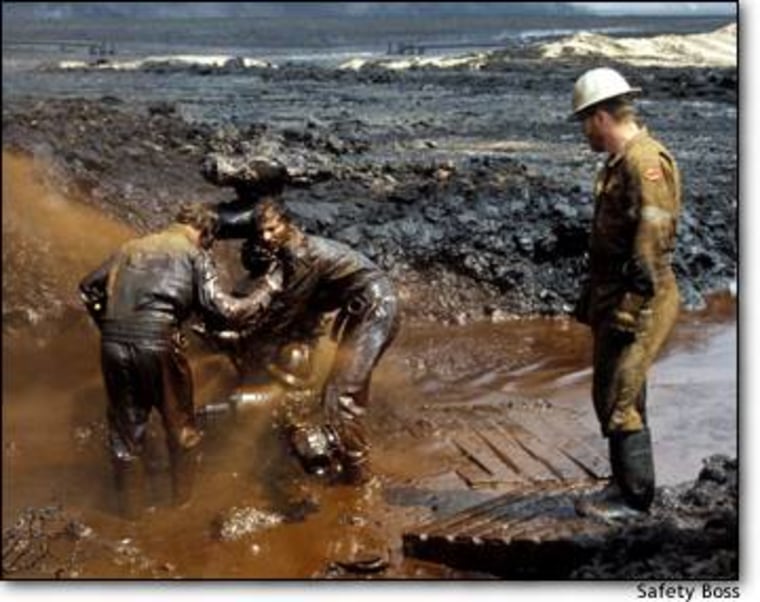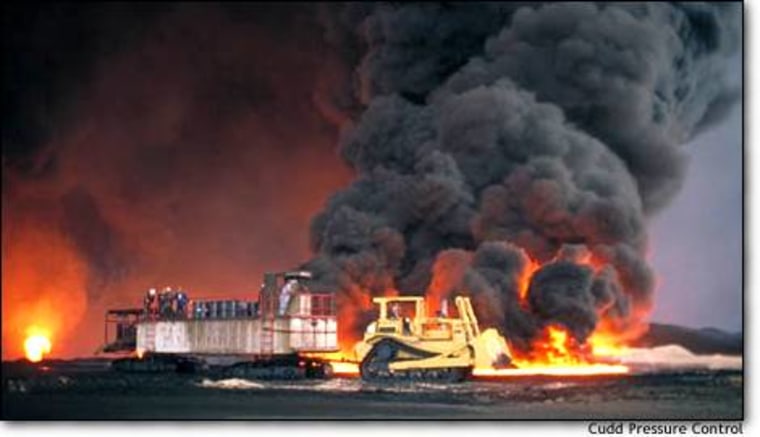Mike Miller has spent most of his life working around raging oil fires and deadly gas leaks, so it stands to reason that he is not easily frightened. But with war looming in Iraq, Miller is growing increasingly concerned about the potential for a disaster that could dwarf the catastrophe unleashed when Saddam Hussein’s retreating troops torched hundreds of Kuwaiti oil wells in the 1991 Gulf War.
“He did it once before, and it would be unforgivably naïve to believe he wouldn’t do it again,” said Miller, chief executive of Safety Boss in Alberta, Canada, one of just four North American companies that specialize in extinguishing oil fires and controlling blowouts.
Miller is worried not so much by the prospect of lingering biological and chemical weapons, land mines or other unexploded ordnance, but by the simple fact that so little has been done to prepare for possible calamity in the vast oil fields of Iraq.
“What a lot of people don’t realize is there was five months of planning put in before the wells were blown up (in Kuwait), and that made an immense difference,” said Miller, whose father founded the family-owned business in 1956. U.S. military officials have contacted Safety Boss and its competitors about the possibility of responding to oil well fires in Iraq, but so far there have been no efforts to draw up a coordinated emergency response plan, Miller said.
That is worrisome to Miller and other veterans of the 1991 Kuwait fires, which were extinguished in 200 days only through a massive response of some 10,000 engineers, firefighters, equipment operators and support personnel from around the world. The cost of putting out the fires alone has been estimated at up to $2.5 billion, with another $20 billion to repair the damage to Kuwait’s oil wells and infrastructure, according to U.S. government sources.
But at least in 1991 well-control specialists and clean-up engineers could count on the deep pockets of Kuwait’s ruling emirate to pay virtually any bills.
“As unromantic as it sounds, the reality of the situation is nobody knows who is going to pay for this,” said Jeff Miller, marketing director for Cudd Pressure Control in Houston. “In Kuwait, you had the Kuwaiti oil company basically writing a blank check. You’re not going to have that this time.”
The conventional wisdom, he said, is that any clean-up costs will be paid for out of future Iraqi oil production, but if U.S. government officials were to suggest that possibility it would surely inflame the passions of critics who contend the prospective war is merely a pretext to grab Iraqi’s vast oil reserves.
It is impossible to guess whether Saddam, if backed into a corner, would choose to go down in history as the leader who broke his nation’s economic backbone. Clearly the Pentagon is bracing for the possibility, saying that securing Iraq’s 1,500 oil wells will be a key early objective of any military action.
“We have a concern that he will try to destroy everything,” a senior Pentagon official told reporters in January. “There are a number of indications through reliable intelligence sources that those activities have been planned and in some cases that they may have been begun,” said the official, who spoke on condition of anonymity.
In an interview with CBS, Saddam indicated he would not blow up wells and other facilities, saying, “Iraq does not burn its wealth, and it does not destroy its dams.”
But Saddam’s words carry little weight with witnesses of the Kuwait fires, who point out that the Iraqi leader has had 12 years to “improve” on the extensive demolition work his forces completed in their five-month occupation of the oil-rich sheikdom. And with twice as many oil wells scattered across a country 25 times the size of Kuwait, Iraq could become a far bigger challenge for the elite oil well control specialists immortalized as “Hellfighters” in the 1968 movie starring John Wayne.
“We are less well-prepared now than we were for Kuwait,” said Les Skinner, a senior well control engineer at Cudd. “The Kuwait Petroleum engineers provided us a great deal of information. We don’t have that in Iraq. We know basically where the fields are located. The wells and their capabilities are unknown.”
What is known is daunting. While Kuwait’s wells were concentrated in a largely uninhabited desert region, Iraq has major oil fields side-by-side with large population centers. Kuwait’s wells were close enough to the Persian Gulf that firefighters were able to pump seawater through oil pipelines to provide the “curtain of water” required to allow men and heavy machinery to work close to fires that burn at up to 2,000 degrees Fahrenheit. Many of Iraq’s wells are in the rugged mountains of the north, and well-control specialists fear water availability could be a major issue.
Pentagon officials estimate it might take two to three years to extinguish hundreds of burning oil wells in Iraq and cost $30 billion to $50 billion to repair and rebuild the country’s oil infrastructure.
And given the extremely tight global supplies and limited excess capacity, widespread sabotage in Iraq could push the world closer to a real energy crisis, said James Williams of WTRG Economics, a consulting firm.
“It’s not that we’re predicting one, but if you’re going to have an energy crisis, today would be a good day to have one,” he said. “All of the factors are ripe for it, particularly from the U.S. side. There’s just no (commercial) inventory to speak of.”
“It is a tremendously different situation in ever so many respects,” said Pat Campbell, chief executive officer of Wild Well Control, also based near Houston.
He said his company has been in contact with “people acting on behalf of our government” and has made an offer of the type of equipment and personnel it could send to Iraq. While no contracts have been signed, Campbell said he assumes his company will be called into action if needed.
“I don’t see how we can not be,” he said. “We believe we are the industry leader.” But despite the potential for windfall profits, Campbell is hoping his company’s services will, in the end, not be needed, saying his engineers and specialists have plenty of routine work to keep them busy without a massive sabotage campaign.
“We don’t wish that on anybody - it would indeed be a catastrophe,” he said. “We don’t depend on it and we don’t need it, although we certainly feel it is our job to respond if it were to take place.”

Any such response would mean millions of dollars in fees to the well-control companies, and big paydays for the firefighting “soldiers of fortune” who keep their bags packed and stand ready for the next big blowout. Top oil firefighters can make up to $1,500 a day for the most grueling, hazardous jobs, or $42,000 for a typical 28-day shift, followed by 28 days off in extended jobs such as the Kuwait disaster.
Miller of Safety Boss would like to see some of the money up front. He said his small firm alone would need about $100 million in capital equipment and operating funds to mount a firefighting operation in Iraq.
He would like assurance that military cargo jets will be made available to transport his equipment, as they were in 1991, and preferably as soon as possible.
“We think they need to get us over there at the front line before any action,” he said. “We’ve been told to get ready, but what does that mean?”
But he acknowledges it is far from clear where the money would come from should Saddam torch his country’s wells.
“The huge difference and the huge gap I see is that you had an intact government in exile with a ton of money in Kuwait, and you have none of that here,” he said. “As a Canadian, I don’t want to be suggesting that the U.S. government has that responsibility, or that the Canadian government has that responsibility. But the money has to be there.”
